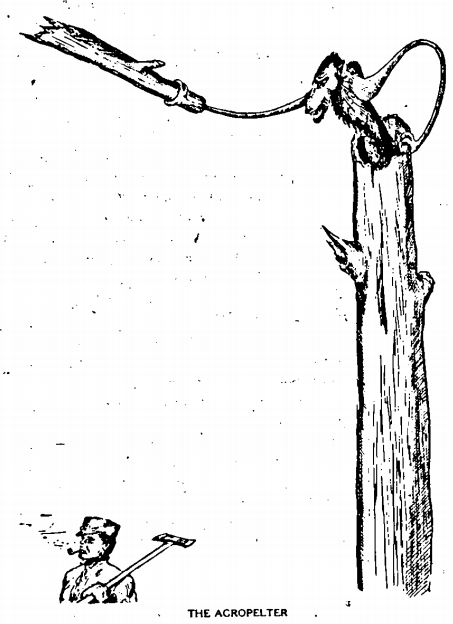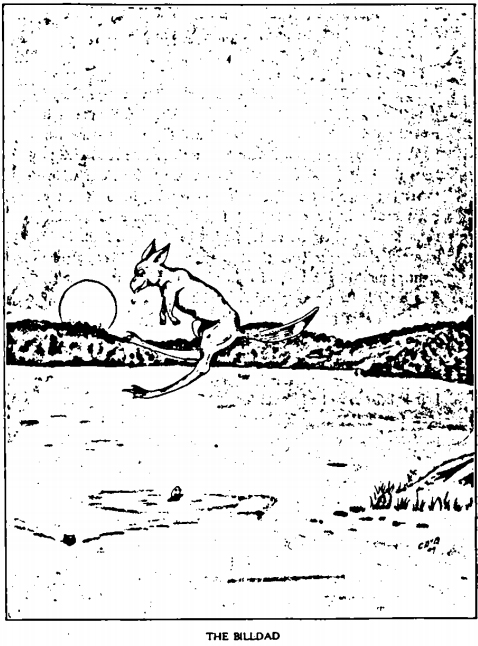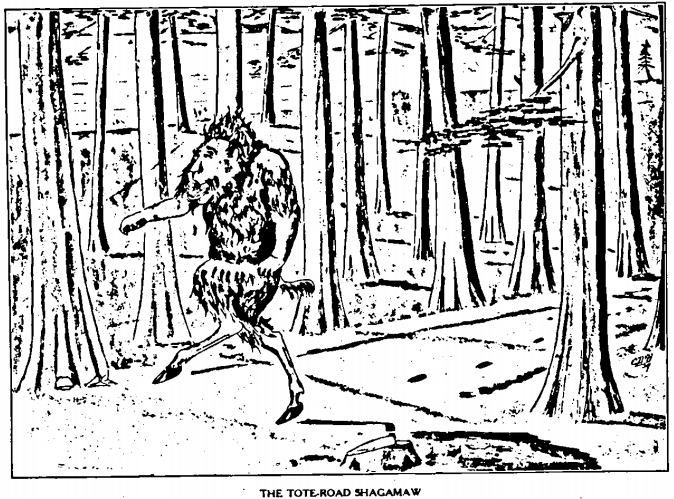
In Episode 133, Jeff Belanger and Ray Auger hit an old logging camp in the woods of western Maine in search of the Agropelter, the Billdad, and the Tote Road Shagamaw. These legendary creatures have haunted and hunted loggers for decades. Are they just tall tales told around the campfire at the end of the day, or could there be something more to it?
CALL (OR TEXT) OUR LEGEND LINE:
(617) 444-9683 – leave us a message with a question, experience, or story you want to share!
BECOME A LEGENDARY LISTENER PATRON:
https://www.patreon.com/NewEnglandLegends
CREDITS:
Produced and hosted by: Jeff Belanger and Ray Auger
Edited by: Ray Auger
Additional Voice Talent: Tim Ellis, Michael Legge, and Tim Weisberg.
Theme Music by: John Judd
SUBSCRIBE TO THE PODCAST FOR FREE:
Apple Podcasts/iTunes | Google Podcasts | Spotify | Stitcher | TuneIn | iHeartRadio | TuneIn | SoundCloud
JOIN OUR SUPER-SECRET:
New England Legends Facebook Group



EPISODE TRANSCRIPT:
*A note on the text: Please forgive punctuation, spelling, and grammar mistakes. Like us, the transcripts ain’t perfect.
[AXE, TREE FALLING]
RAY: Timmmmber!
JEFF: It’s good to be back up here in the woods of western Maine, Ray!
RAY: I agree. The clean air, the honest, manly work.
JEFF: Yeah, nothing makes you feel quite like a man than knocking down giant trees.
[TREE FALLING]
JEFF: Heads up!
RAY: I love that we’re miles from civilization, too. I mean, this is what this part of Maine looked like centuries ago. It still feels untouched.
JEFF: It does. But being this remote is also a little scary. We don’t exactly know what strange beasts may be lurking in the dark forest all around us.
[STRANGE ANIMAL CRIES IN THE DISTANCE]
RAY: What was that?!
JEFF: I have no idea, but I hope it’s not one of the three legendary monsters said to torment the loggers of Maine. Today we’re looking for the Agropelter, the Billdad, and the Tote Road Shagamaw.
[INTRO]
JEFF: Hello, I’m Jeff Belanger and welcome to episode 133 of the New England Legends podcast. If you give us about ten minutes, we’ll give you something strange to talk about today.
RAY: And I’m Ray Auger, thanks for camping out with us as we document every single legend in New England one story at a time. Think of us as your modern-day Brothers Grimm.
JEFF: Our episode this week is brought to you by our Patreon patrons! This growing army of people kick in just $3 bucks per month because they believe in what we’re doing. They know great things happen when we share these stories. Plus they get early access to new episodes and bonus episodes that no one else gets to hear. If you want to become an even bigger part of the family, head over to patreon.com/newenglandlegends to sign up.
RAY: Speaking of family, we love hearing from you guys. Whether you call or text our Legend Line anytime at 617-444-9683, or if you join our super secret facebook group. A lot of story leads come from you. Like this week! Thanks to Mike Adamovic for tipping us off about these strange beasts in the woods of Maine.
JEFF: This isn’t the first time we’ve tracked strange creatures in Maine.
RAY: No it isn’t. We hunted the Spectral Moose of Lobster Lake back in Episode 64, and Old Razor Shins in Episode 50.
JEFF: Right. But this time we’re searching for three different creatures. Most of what we know about these legends comes from the 1910 book Fearsome Creatures of the Lumberwoods by William T. Cox. So with that in mind we’re going to head to a remote logging camp in western Maine near to small town of Skinner, to the very heyday of logging.
[TRANSITION]
RAY: It’s 1805, and here in the woods of Maine, it’s busy.
[CHOPPING AND FALLING TREES]
RAY: This new nation called the United States needs lumber to build houses, businesses, and mighty ships. So the northeast turns to Maine for wood.
JEFF: Logging camps spring up as the men fell trees all day long, then camp in the woods at night. They stay up here for weeks at a time.
[CAMPFIRE / CRICKETS]
JEFF: As daylight turns to darkness, the loggers find themselves sitting around a campfire cooking their suppers and telling stories of the strange things they’ve seen and heard about in the woods. You can’t blame them for spinning yarns and comparing scars. Some of these tales are funny, but some involve creatures unlike anything you’ve ever heard about before. Listen… it looks like old Red there is about to tell us about the Agropelter.
RED: Leading a vengeful existence, and resenting the intrusion of the logger, the agropelter deals misery to the lumberjack from Maine all the way to Oregon. Ill fares the man who attempts to pass a hollow tree in which one of these creatures has taken up its temporary abode. The unfortunate is usually found smashed or pinned by a dead branch and reported as having been killed by a falling limb. So unerring is the aim of the agropelter that despite diligent search I have been unable to locate more than one man who has been the target for one of the missiles and yet survived to describe the beast. This is Big Ole Kittleson, who, upon a certain occasion, when cruising timber on the Penobscot River, was knocked down by a partly rotten limb thrown by an agropelter. This limb was so punky that it shattered on Ole’s head, and he had time to observe the rascally beast before it bounded from the tree and whisked itself off through the woods.
According to Ole, the animal has a slender, wiry body, the villainous face of an ape, and arms like muscular whiplashes, with which it can snap off dead branches and hurl them through the air like shells from a six-inch gun. It is supposed to feed upon hoot owls and woodpeckers, the scarcity of which will always prevent the agropelter from becoming numerous in any locality.
RAY: So some ape-like creature is hiding in hollow trees and crushing unsuspecting loggers with giant branches?
JEFF: Yeah, that’s what it sounds like. I can imagine finding a logger crushed by a branch is something the men of camp have encountered now and again. And I’m sure they have to wonder if it’s just bad luck, an accident, or… maybe it’s the agropelter.
RAY: Do you think this could be the case of assigning some monster to what is otherwise an accident?
JEFF: It could be, but sometimes these guys seem so sure of these stories they’re telling.
RAY: I see Big Jim over there twitching just a bit. He was telling me a little earlier about the strangest creature I’ve ever heard of. He called it a Billdad.
BIG JIM: If you have ever paddled around Boundary Pond, in northwest Maine, at night you have probably heard from out the black depths of a cove a spat like a paddle striking the water. It may have been a paddle, but the chances are ten to one that it was a billdad fishing. This animal occurs only on this one pond, in Hurricane Township. It’s about the size of a beaver, but has long, kangaroo-like hind legs, short front legs, webbed feet, and a heavy, hawk-like bill. Its mode of fishing is to crouch on a grassy point overlooking the water, and when a trout rises for a bug, to leap with amazing swiftness just past the fish, bringing its heavy, flat tail down with a resounding smack over him. This stuns the fish, which is immediately picked up and eaten by the billdad. It has been reported that sixty yards is an average jump for an adult male.
Up to three years ago the opinion was current among lumberjacks that the billdad was fine eating, but since the beasts are exceedingly shy and hard to catch no one was able to remember having tasted the meat. That fall one was killed on Boundary Pond and brought into the Great Northern Paper Company’s camp on Hurricane Lake, where the cook made a most savory slumgullion of it. The first and only man to taste it was Bill Murphy, a toe-road swamper from Ambajejus. After the first mouthful his body stiffened, his eyes glazed, and his hands clutched the table edge. With a wild yell he rushed out of the cook-house, down to the lake, and leaped clear out fifty yards, coming down in a sitting posture—exactly like a billdad catching a fish. Of course, he sank like a stone. Since then not a lumberjack in Maine will touch Billdad meat, not even with a pike pole.
JEFF/RAY: Come onnnnn…
RAY: It feels like these tales are getting taller by the minute. Almost like these guys are trying to outdo each other.
JEFF: I’m sure there’s some of that going on. Check out the smile on Old Blue’s face over there. Hey Blue! Tell us about that Tote Road Shagamaw.
OLE BLUE: From the Rangeley Lakes to the Allegash and across in New Brunswick, loggers tell of an animal which has puzzled many a man, even those who were not strangers in the woods. Frequently the report is circulated that the tracks of a bear have been seen near camp, but a little later this is denied and moose tracks are reported instead. Heated arguments among the men, sometimes resulting in fist fights, are likely to follow. It is rightly considered an insult to a woodsman to accuse him of not being able to distinguish the track of either of these animals. To only a few of the old timber cruisers and rivermen is the explanation of these changing tracks known. Gus Demo, of Oldtown, Maine, who has hunted and trapped and logged in the Maine woods for 40 years, once came upon what he recognized as the tracks of a moose. After following it for about 80 rods it changed abruptly into unmistakable bear tracks; another 80 rods and it changed to moose tracks again. It was soon observed by Mr. Demo that these changes took place precisely every quarter of a mile, and, furthermore, that whatever was making the tracks always followed a tote road or a blazed line through the woods. Coming up within sight of the animal, Gus saw that it had front feet like a bear’s and hind feet like those of a moose, and that it was pacing carefully, taking exactly a yard at a step. Suddenly it stopped, looked all about, and swung as on a pivot, then inverting itself and walking on its front feet only, it resumed its pacing. Mr. Demo was only an instant in recognizing by the witness trees that the place where the animal changed was a section corner. From this fact he reasoned that the shagamaw must have been originally a very imitative animal, which, from watching surveyors, timber cruisers, and trappers patiently following lines through the woods, contracted the habit itself. He figures that the shagamaw can count only as high as 440; therefore it must invert itself every quarter of a mile.
RAY: (LAUGHING) Okay, that’s all I can take of these tall tales… And that… brings us back to today.
[TRANSITION]
RAY: Okay, I get it. You spend weeks out here in the woods chopping wood all day. You sit around the campfire at night and have to keep yourselves entertained, so you spread these stories you heard about.
JEFF: Buuutt there’s just enough truth in these tales, some little tiny piece that makes you wonder if there’s something to it.
RAY: In the case of the agropelter, I get it. Loggers do indeed die if a giant limb falls on top of them, or if a tree doesn’t land quite right.
JEFF: I’ve been known to take down a tree or two with my chainsaw, Ray.
RAY: Okay.
JEFF: The funny thing about a falling tree is that it happens kind of slowly. As you cut through it starts to crack, break, and then it takes a second or two to actually fall. And you get a pretty good sense of which direction it’s falling if you do it right. The only way you can get hurt is if you’re not paying attention.
RAY: Or if, say, I’m chopping down a tree nearby, and get so caught up in my own chopping that I don’t hear you yell timber. And the next thing you know… I’m crushed.
JEFF: And instead of me taking accountability for the accident… I spread the story of the agropelter and the legend grows.
RAY: Right. I have to say, though, the Billdad was my personal favorite. Eat the thing and you hop like a mighty frog.
JEFF: Again, we’re out here in these isolated woods, we see odd critters, and we long for more interesting foods than the lame provisions of the camp. Of course we’re going to wonder what would happen if you cooked one of the strange forest creatures.
RAY: The lesson of the Billdad is you shouldn’t necessarily eat any random animal you find.
JEFF: And this story is so specific: Boundary Pond. Nowhere else as far as we know. If you ever find yourself out there and you know the story, you can’t help but wonder if there is some high-jumping unknown creature on the border of the U.S. and Canada.
RAY: What about the Tote Road Shagamaw? A creature that can only count to 440 before switching the way it walks?! Come onnn.
JEFF: Yup. Think about the fights that would start between loggers arguing over someone who can’t tell the difference between a moose track and a bear? If a creature is out there that can make both tracks, it settles a lot of arguments and keeps a little peace in the logging camps.
RAY: So each story serves its purpose.
JEFF: And makes us wonder… just a little bit… when we’re way out here in the remote woods of western Maine. What strange things may be lurking nearby.
[ANIMAL SCREAM]
RAY: Yeah, I think we should get going. I’ve seen what happens to guys who spend too long in the woods, Jeff. You get nicknames like Old Blue, and Old Red, and next thing you know some wild beast is throwing trees at you as it hops around on bear and moose feet.
[OUTTRO]
JEFF: And with that, you may have just given birth to the agro-billdad-shagamaw.
RAY: (LAUGHING) I guess that’s a story for another day. Just a reminder that the discussion about this story continues on our Patreon page in our extras. Head to Patreon.com/NewEnglandlegends where we go more in-depth about each episode.
JEFF: If you enjoy our stories each week, please post a review, or tell a friend or two about us. Great things happen when we share these stories.
RAY: We’d like to than Tim Ellis from the Creaking Door Podcast, Michael Legge, and Tim Weisberg from Midnight in the Desert, all for lending their voice acting talents this week. And our theme music is by John Judd.
VOICEMAIL: Hi, this is Laurie Bastian from Pembroke, Massachusetts until next time remember the bizarre is closer than you think.
Copyright © 2020 New England Legends. All rights reserved.
